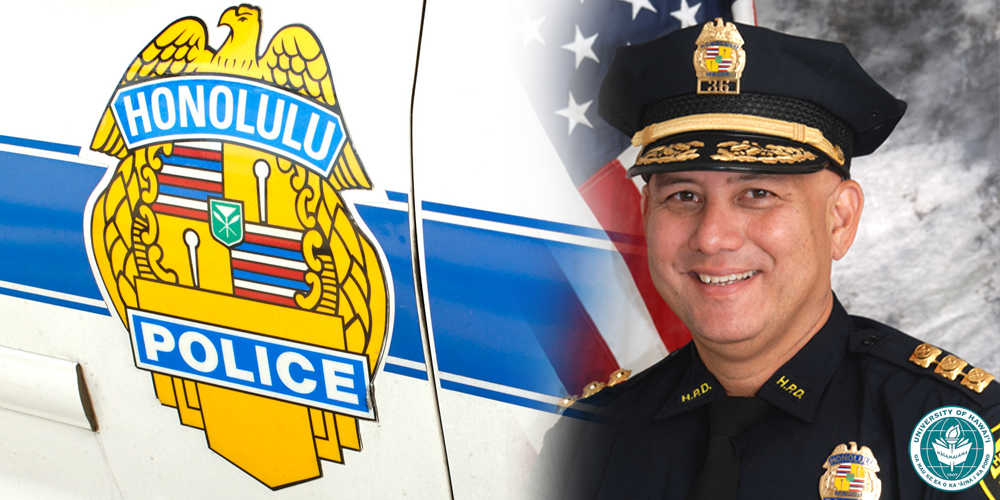
Honolulu CC alumnus Kurt Kendro
– Written by Honolulu CC journalism students Kiki Williams and Vania Graves
Recently retired Honolulu Police Major Kurt B. Kendro supervised 160 police officers in the far-flung Kapolei District, which stretches from ‘Ewa Beach to Ka‘ena Point and serves a population of 160,000 people. In addition to providing 24-hour-a-day law enforcement to those residents, Kendro was also responsible for a $16 million budget for his unit and two police stations, and had to monitor such smaller things as building maintenance and electrical usage.
“It’s not really something they teach in police recruit school,” he says.
Kendro got started on his law enforcement path at Honolulu Community College, where he graduated from the Administration of Justice program. Originally, he had intended to go into the Army after high school, but he injured his wrist and decided to try Honolulu CC, which he said helped him to understand the structure and development of law.
The school also introduced him to a broad range of liberal arts classes—like history, English and math—which he says also serve him well in his job today. History classes, for instance, taught him aspects of the U.S. Constitution, development of law and how the courts work. And his Speech 151 course was a great class which helps him to this day when he does public speaking, or has to address the Legislature, City Council or news reporters.
“I remember we had to do the history of plate lunches in speech class,” Kendro said. “You had to be prepared for that class; the lessons I learned in that class, those lessons are still in practice today,” he said.
Even so, he says that the most valuable class he ever took for his police work might have been in high school: typing. It helped him do his job much better, because most of his days were spent typing on a computer since he was an administrator and manager. He typed documents daily. “That is a long answer to a very short question,” he says.
Which professors stand out in his memory from the Honolulu CC days?
“Most of the Administration of Justice professors were police officers: Forrest Broome, David Heaukulani and Sydney Kim Han. Other instructors included police officers, detectives, or high ranking officers within the police department,” he said.
Even more memorable were his fellow students: “A lot of my peers became police officers or went into the field of law enforcement such as corrections, Sheriff's Department and federal agencies and firefighting. It was kind of fun being with a cohort group that all went through the same electives,” Kendro said.
After Honolulu CC, Kendro got his bachelor’s degree from the Honolulu campus of Wayland Baptist University and started working his way up the HPD ranks.
The process of obtaining rank in the police department is based on years of experience and education, which all count toward the promotion process. When he became a sergeant, he already had nine years on the force. He became a lieutenant within 13 years, captain four years later (17 years), and was promoted to major after 20 years in the department. He served as a major for the last 10 years and now plans to take a job in the private sector.
His advice for upcoming students going into the Administration of Justice Program is, “You have to have education and experience, they go hand and hand in order to be successful. You can’t be completely book smart, or completely street smart in order to be successful. You have to have a balance of the two because they aren’t interchangeable,” he said.
And you can’t ever stop learning. “You never stop learning. In order to be successful in any career you have to stay current with what’s going on,” he said.
Asked to sum up his Honolulu CC experience in three words, he comes up with these:
- Atmosphere: It was great because he was excited about learning a new career field.
- Invaluable: The education was invaluable because you can’t put a dollar sign on the basics of your education at the start of your career, he said.
- Experience: The experience was great because the cohort group he was with all took the same classes and shared the same interests. After graduation he stayed in contact with those people, and they continue to make a difference in his life and career.
As for others, he suggests that students set goals for themselves and then keep striving to reach them. Kendro said he knew early on that he wanted to be more than just a police officer; he set his goal on becoming a major.
The most challenging part of his career was knowing that he and other officers are looked up to by the public in the most difficult of times. He was the first and only person in his family to join the police and says his mother was terrified when he joined the force, buying him his first bullet-proof vest. Since then he has been beat up, spit on, shot at, cut with knives and in fights where he was outnumbered but needed to protect other people. He also said two officers in his recruiting class were killed in the line of duty, one in his home while sleeping by a drug dealer and the other hit by a drunk driver while giving a speeding ticket.
When people are victims of crimes, they face the worst thing in their life and look toward the police to help them through the process, he said. In the end, that’s what makes the job rewarding.
Earlier this year, Kendro received the Silver Medal of Valor, the department’s second-highest award, for his work in a heroic rescue. On New Year’s Eve 2015, while patrolling the area for illegal fireworks, Kendro came across a house fire in the Historic Plantation Villages in ‘Ewa Beach. He attempted to alert the residents of the home by pounding on the walls and the front door but received no answer. When another officer arrived, they attempted to put out the flames with a fire extinguisher and garden hoses. Neighbors alerted the officers that a female was still in the house. Without hesitation, Kendro and the other officer entered the burning home and helped the 76-year-old woman escape. Their quick actions saved the resident’s life and prevented the home from becoming a total loss.
“Ninety-nine percent of the police officers like being cops because they loving helping people to make this a better society to live in,” Kendro said. He wouldn’t trade 30 years of experience like that for anything else.
